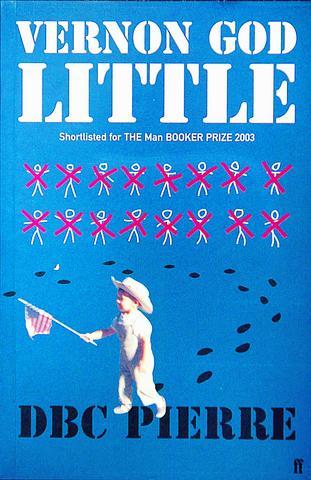NOW, AT LEAST, he can start to pay that money back. The many creditors of the novelist D.B.C. Pierre were given a crumb of comfort on Tuesday when the self-confessed serial "cheating bastard" won literature's most famous prize -- the Man Booker -- in an extraordinary final twist to an already bizarre story.
Pierre, the nom de plume of the reformed Mexican-Australian wildman Peter Finlay, is the oddest and most controversial character to have won the award, which made the careers of Salman Rushdie, J.M. Coetzee and Margaret Atwood. Last week he confessed to the London-based Guardian newspaper to betraying and fleecing his friends in a decade-long rampage over four continents that culminated in swindling an elderly American artist out of his home.

PHOTO: AP
But three years ago, having fled to Ireland, a repentant Finlay began to swop the life of a fantasist for that of a fiction writer and created a character in Vernon God Little who has been called the Huckleberry Finn of the Eminem generation.

PHOTO: REUTERS
In an effort to prove that his rehabilitation was genuine, Finlay took on his pseudonym, which stands for "Dirty But Clean" Peter, a wry joke that was meant to signal that Finlay -- who has lived in terror of being unmasked since he was nominated for the prize -- had put his murky, buccaneering past behind him.
In his 42 years he has managed to get himself shot by a neighbor in Mexico City, work up debts of hundreds of thousands of dollars, cultivate drug and gambling addictions and leave behind a trail of wronged women, despite having to have his face reconstructed by surgeons after a horrific car crash. In between he has managed unsuccessful careers as a filmmaker, treasure hunter, smuggler and graphic artist.
Now he can add "Man Booker" winner to that gobsmacking curriculum vitae, and he can even start paying back the creditors he has vowed to make amends to. The
?50,000 (US$78,000) prize money is only the start -- Booker winners invariably go on to make fortunes on the back of increased sales and telephone number advances for their next books.
But it was his rollicking debut, Vernon God Little, rather than his Rabelaisian personal life which mesmerized the judges, Professor John Carey, their chairman, insisted. Like Finlay, the Texan teenager who is the hero of the book lied himself into a corner. Unlike Finlay, Vernon faced the death penalty, and not just the ire of his creditors and former girlfriends. Carey called the book "a coruscating black comedy reflecting our alarm and fascination with modern America."
Everyone loves a rogue, particularly a repentant one and many felt that the jury came down finally in favor of the Mexican-Australian for the elan of his writing which has the color of a life lived at suicidal speed.
In an intriguing twist to the tale, the odds on Pierre shortened dramatically in the last few days to 2-1 from 5-1.
Martyn Goff, the director of the prize, said only once before in its 35-year history had the judges made such a quick decision."It was amazing, it was all over within an hour. Four of the five judges jumped at Pierre and the fifth was not unhappy. I am absolutely shocked myself by the speed of it.
"Maybe they felt sorry for him because of his debts. Reading the book, you get the feeling it could only have been written by an American, when we know that it wasn't written by one. We thought it was the most imaginative, unprecedented book for an English person to write," he said.
Pierre/Finlay, however, despite his Australian twang, prefers to call himself a Mexican. The one group who will not be toasting his victory are the bookies, who, having played a part in Finlay's earlier downfall, were badly burned.
Graham Sharpe, of William Hill, the doyen of literary sweep stakes, was sour about the shortlist.
"It was difficult to motivate myself to read the books. It is certainly the least impressive year I can remember," he said.
But if the shortlist was unimpressive, the longlist and the pool of 100 more novels from which it was drawn, was equally short on shock and awe.
Martin Amis, the perennial nearly man of British letters, failed yet again to live up to papa, Kingsley, who won the Booker with The Old Devils. The manner of his failure this time, however, was utterly humiliating.
He only made the longlist for The Yellow Dog -- a comic novel which several critics agreed was a dog indeed -- because the judges apparently felt sorry for him after the novelist Tibor Fischer, a former fan, had savaged him.

In the March 9 edition of the Taipei Times a piece by Ninon Godefroy ran with the headine “The quiet, gentle rhythm of Taiwan.” It started with the line “Taiwan is a small, humble place. There is no Eiffel Tower, no pyramids — no singular attraction that draws the world’s attention.” I laughed out loud at that. This was out of no disrespect for the author or the piece, which made some interesting analogies and good points about how both Din Tai Fung’s and Taiwan Semiconductor Manufacturing Co’s (TSMC, 台積電) meticulous attention to detail and quality are not quite up to

April 21 to April 27 Hsieh Er’s (謝娥) political fortunes were rising fast after she got out of jail and joined the Chinese Nationalist Party (KMT) in December 1945. Not only did she hold key positions in various committees, she was elected the only woman on the Taipei City Council and headed to Nanjing in 1946 as the sole Taiwanese female representative to the National Constituent Assembly. With the support of first lady Soong May-ling (宋美齡), she started the Taipei Women’s Association and Taiwan Provincial Women’s Association, where she

It is one of the more remarkable facts of Taiwan history that it was never occupied or claimed by any of the numerous kingdoms of southern China — Han or otherwise — that lay just across the water from it. None of their brilliant ministers ever discovered that Taiwan was a “core interest” of the state whose annexation was “inevitable.” As Paul Kua notes in an excellent monograph laying out how the Portuguese gave Taiwan the name “Formosa,” the first Europeans to express an interest in occupying Taiwan were the Spanish. Tonio Andrade in his seminal work, How Taiwan Became Chinese,

Mongolian influencer Anudari Daarya looks effortlessly glamorous and carefree in her social media posts — but the classically trained pianist’s road to acceptance as a transgender artist has been anything but easy. She is one of a growing number of Mongolian LGBTQ youth challenging stereotypes and fighting for acceptance through media representation in the socially conservative country. LGBTQ Mongolians often hide their identities from their employers and colleagues for fear of discrimination, with a survey by the non-profit LGBT Centre Mongolia showing that only 20 percent of people felt comfortable coming out at work. Daarya, 25, said she has faced discrimination since she